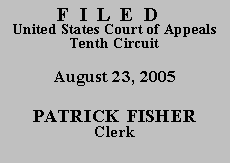

| UNITED STATES OF AMERICA,
Plaintiff-Appellee,
v.
RODNEY D. THOMAS Defendant-Appellant. |
No. 05-3075
(D.C. Nos. 04-CV-3301-RDR and 02-CR-40091-01-RDR) (Kansas) |
On October 8, 2002, Mr. Thomas entered a plea of guilty to possession with intent to distribute five grams or more of a substance containing a detectable amount of cocaine base in violation of 21 U.S.C. § 841(a)(1). He was sentenced on August 1, 2003, to a term of imprisonment of 100 months. Judgment against him was filed on August 4, 2003. Mr. Thomas did not appeal. Then, on September 5, 2004, Mr. Thomas filed a motion to vacate, set aside, or correct his sentence pursuant to 28 U.S.C. § 2255. He alleged he was entitled to sentencing relief pursuant to Blakely v. Washingon, 542 U.S. 296 (2004). The district court denied Mr. Thomas' § 2255 petition, noting the Supreme Court's ruling in Blakely and its ruling in United States v. Booker, 125 S. Ct. 738 (2005), do not apply retroactively to cases on collateral review. The court subsequently denied Mr. Thomas' petition for COA, and Mr. Thomas now seeks relief before our court, citing to both Booker and Blakely as the bases of his claims.
The issuance of a COA is jurisdictional. Miller-El v. Cockrell, 537 U.S. 322, 336 (2003). A COA can issue only "if the applicant has made a substantial showing of the denial of a constitutional right." 28 U.S.C. § 2253(c)(2). "A petitioner satisfies this standard by demonstrating that jurists of reason could disagree with the district court's resolution of his constitutional claims or that jurists could conclude the issues presented are adequate to deserve encouragement to proceed further." Miller-El, 537 U.S. at 327. "The COA determination under § 2253(c) requires an overview of the claims in the habeas petition and a general assessment of their merits." Id. at 336. "This threshold inquiry does not require full consideration of the factual or legal bases adduced in support of the claims. In fact, the statute forbids it." Id. While Mr. Thomas, in applying for a COA, is not required to prove the merits of his case, he must demonstrate "something more than the absence of frivolity or the existence of mere good faith on his . . . part." Id. at 338 (internal quotations and citation omitted). In addition, because Mr. Thomas seeks to proceed ifp in this appeal, he must demonstrate that he is financially unable to pay the requisite fees, and that there exists "a reasoned, nonfrivolous argument on the law and facts in support of the issues raised on appeal." McIntosh v. United States Parole Comm'n, 115 F.3d 809, 812-13 (10th Cir. 1997) (internal quotation omitted). With these principles in mind, we have carefully reviewed Mr. Thomas' brief, the record of these proceedings, and the district court's order.
We have held that neither Blakely or Booker can be applied retroactively to cases on collateral review. See United States v. Bellamy, 411 F.3d 1182, 1186-87 (10th Cir. 2005) (holding neither Blakely nor Booker can be applied retroactively); United States v. Prince, 400 F.3d 844, 849 (10th Cir. 2005) ("Blakely does not apply retroactively to convictions that were already final at the time the Court decided Blakely, June 24, 2004."). Accordingly, reasonable jurists would not debate the district court's determination that the Supreme Court's rulings in Blakely and Booker cannot be applied retroactively to Mr. Thomas' case. Mr. Thomas' request for a COA and his motion to proceed ifp are DENIED.
SUBMITTED FOR THE COURT
Stephanie K. Seymour
Circuit Judge
*.The district court denied Mr. Thomas' application for a COA.